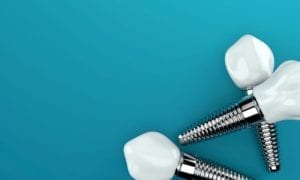Both dentures and dental implants are popular ways to replace lost teeth. But how do you know which is the best choice? The team at the Stein Center for Advanced Dentistry discusses the positives and negatives of Skokie, IL dental implants and dentures.

What to Know About Dentures
Removable dentures are often used to replace a full arch of missing teeth, but partial dentures are also available. They’re made up of a metal and resin base that supports plastic or ceramic teeth. Some of the benefits of dentures include that they’re cheaper upfront and you get your final restoration faster because there’s no surgical element.
However, dentures do come with a lot of negatives. While you don’t pay as much upfront, you’re likely to incur more costs in the future. When you’re missing teeth, the jawbone in those areas starts to deteriorate. Since dentures don’t replace the tooth root, the jawbone continues to deteriorate, even with the restoration. The dentures will become unusable until they’re readjusted or replaced as your jawbone changes.
Dentures only give you back about 30-40% of your bite function and require adhesive to stay in the mouth. You risk your denture slipping or falling out when you eat or speak. Certain foods will have to be removed from your diet because the denture can’t handle them. Due to the adhesive, they’ll need to be removed every night and cleaned properly.
What to Know About Dental Implants
The biggest qualm people have about implants is the price. But while they may be more expensive up front, you don’t incur any further costs with them.
Implants have a surgical element, too. Once the posts are placed, they need 3-6 months to heal before continuing. But this healing time is essential to get the stability implants are known for. The posts fuse with the jawbone to give you back 100% of your bite function. You don’t need to change your diet or worry about your restoration slipping or falling out.
Even with advancements in dentistry, dentures are still bulky and can be difficult to get used to. But with dental implants, especially if the final restoration is a dental crown, you get a restoration that both looks and feels the most natural. You don’t have any extra maintenance either. Just brush, floss, and make regular dentist visits!
